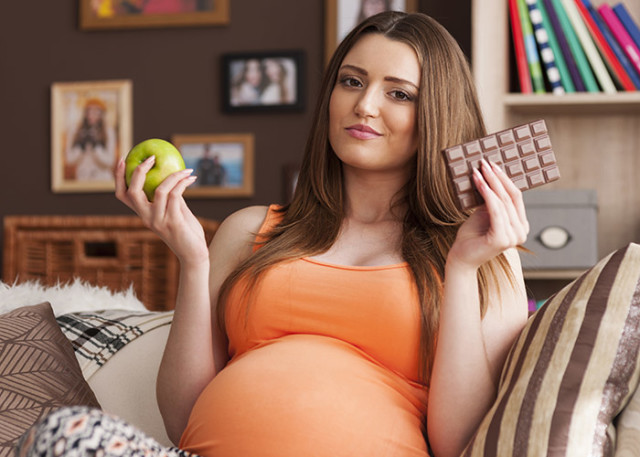did Eating Chocolate during Pregnancy is Good?
 |
| image source: http://www.shapeb.com/ |
A study shows that pregnant women who every day eat a small piece of chocolate, especially dark chocolate, can get the health benefits of increased blood circulation to their fetuses. Other advantages that are not less important is to reduce the risk of preeclampsia. Also, chocolate also has outstanding antioxidant potential.
Chocolate with a cocoa content (original brown beans) of the highest known to have greater health benefits as well. This type of chocolate is characterized by a relatively more bitter taste. Also, the more bitter the chocolate is also better for overall health because of lower sugar levels.
With the new findings of the active phenolic compounds in cocoa, a bad perception about chocolate consumption began to change. Since long, brown is attached to the health of the bad news because of the fat content, as well as chocolate consumption, was associated with high blood pressure, obesity, acne, diabetes, and coronary artery disease.
Meanwhile, the new findings known that consumption of chocolate in small portions in pregnant women can bring the following benefits is probable.
Lowering the risk of preeclampsia and hypertension
One study found that eating chocolate at first or third trimester of pregnancy was associated with a reduced risk of preeclampsia, and was associated with a lower risk for high blood pressure (hypertension) in the first quarter of pregnancy. Preeclampsia is itself a condition that could potentially endanger the lives, that is when the blood pressure in pregnant women suddenly increased drastically to dangerously high blood pressure. The results showed that pregnant women who regularly consume 1-3 servings of chocolate per week had a 50 percent lower risk of preeclampsia during the first trimester.
However, this study has some shortcomings that should be discussed. The first, the study interviewed pregnant women less than 16 weeks about how much they eat chocolate in the first trimester. In other words, the answer is very dependent on the memory of pregnant women who might answer is not so accurate. Secondly, the study also does not distinguish between dark chocolate and light chocolate in interviews and analysis. This may affect the results obtained.
Effects bitter chocolate consumption against the risk of preeclampsia
This study departs from the consequences of chocolate can reduce the possibility of heart disease. The researchers in previous studies claim that eating chocolate, especially dark chocolate, can minimize the risk of cardiovascular disease. Chocolate contains flavanols that are known to be linked to a reduced risk of cardiovascular disease as well as a decrease in cholesterol levels. The darker the chocolate, the more it contains flavonols.
Meanwhile, pre-eclampsia risk factors are similar to risk factors for cardiovascular disease. Therefore, they then examined the actual no link between chocolate consumption with a reduced risk of preeclampsia in pregnant women. Research conducted on nearly three thousand pregnant women with gestational age less than 16 weeks. Although this study has been done well, have not been able to provide substantial evidence that chocolate can protect pregnant women from the risk of preeclampsia. Still, more research is needed to confirm and explain the protective effects of chocolate on the risk of preeclampsia.
For fetal growth
A different study concluded that eating 30 grams of chocolate per day during pregnancy can be beneficial for fetal growth and development. The study found a significant improvement when examination uteroplacental blood flow (uterus and placenta) using Doppler in women who eat chocolate, fine chocolate with flavonol levels of high and low. This suggests that chocolate can be beneficial to both the growth and development of the fetus, as well as the positive impact of the placenta. This increase is much larger than what is generally expected.
This enhancement effect is not solely and directly thanks to the content of flavanols in chocolate. Researchers also could not speculate on the overall effect of chocolate on the risk of preeclampsia from the study because the study subjects were only one group, the group of pregnant women who eat chocolate, so no comparison group of pregnant women who do not eat chocolate. Therefore, other studies are needed more in-depth about this.
How much chocolate can be consumed by pregnant women?
A professor of obstetrical and gynecological say that regularly eating dark chocolate in small portions since the first trimester of pregnancy may increase the function of the placenta. Small pieces in question are 30 grams a day, equivalent to only a few bites.
Eating too much chocolate is not good for pregnant women because it can increase body weight over the ideal. Also, many other nutrients need to be consumed by pregnant women, such as folate, protein, calcium and iron, so do not just stare at chocolate consumption.
Advice from experts is to eat chocolate once in a while rather than routinely. Furthermore, chocolate contains caffeine which should only be consumed in small amounts during pregnancy, not to mention high in calories and fat as well. Conclusion for pregnant women, both of which are considered at risk of developing preeclampsia or not, it must always follow the advice of their doctor to get the ideal nutrition.
Tags :
healthy tips
Subscribe by Email
Follow Updates Articles from This Blog via Email

No Comments